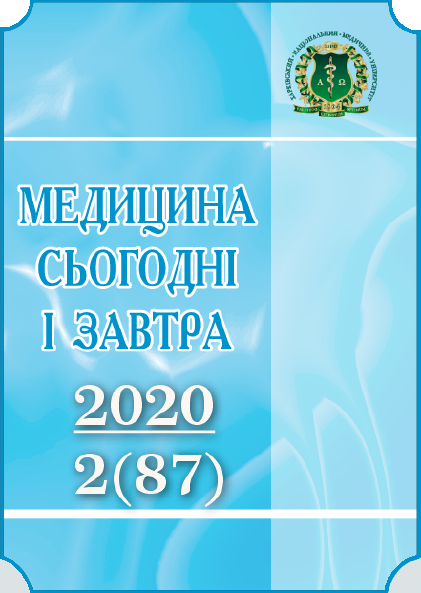Abstract
The level of immune complex reactions in combatants with non-psychotic mental disorders was studied. A clinical-psychopathological and clinical-biochemical examination of 95 combatants with non- psychotic mental disorders were conducted. In the clinical picture of prolonged depressive reaction, there was a decrease in mood, feelings of sadness, anxiety, anhedonia, asthenic manifestations, detachment, lack of hope, guilt of the survivor. Mixed anxiety-depressive reaction was characterized by low mood, feelings of depression, helplessness, insecurity, feelings of despair, sadness, isolated obsessive fears, doubts about the correctness of decisions and actions that are closely related to anxious thinking in relation to their assessment in the eyes of others. Post-traumatic stress disorder was manifested by low mood, anxiety, internal tension with inability to relax, danger, anxiety, flashback effects, symptoms of intrusion, asthenia, irritability, propensity to affective reactions. It was found that in the examined patients there was an increase in the concentration of circulating immune complexes, mainly due to the most pathogenic fractions of medium and low molecular weight and suppression of phagocytic activity of monocytes. Changes in immune complex reactions were most pronounced in post-traumatic stress disorder.
References
Moroz S.M., Morhachova A.K., Yavorskaia I.P., Khaitov R.P (2015). Travma vzryvnoi volnoi, komorbidnaia so stressom boievykh deistvii [Blast trauma comorbid stress fighting], Arkhivpsykhiatrii - Archives of Psychiatry, vol. 21, issue 2 (81), pp. 47-50. Retrieved from http://nbuv.gov.ua/UJRN/apsuh_2015_21_2_ll [in Russian].
Druz O.V., Chernenko 1.0. (2017). Napriamky medyko-psykholohichnoi profilaktyky poststresovykh psykhichnykh rozladiv u uchasnykiv lokalnykh boiovykh dii [Directions medical and psychological prevention post-traumatic mental stress disorders in local participants fighting], Ukrainskyi visnyk psykhonevrolohii - Ukrainian Bulletin of Psychoneurology, vol. 25, issue 1 (90), pp. 45-48. Retrieved from http ://nbuv.gov.ua/UJRN/Uvp_2017 25 1 11 [in Ukrainian].
Chaban O.S., Frankova I.A. (2015). Sovremennyie tendentsyi v diahnostike i lechenii post- travmaticheskoho stressovoho rasstroistva [Current trends in the diagnosis and treatment of post-traumatic stress disorder], NeuroNEWS, vol. 2, issue 66, pp. 8-18 [in Russian],
Viazmitinova S.A. (2019). Effektivnost sanatomo-kurortnoho lecheniia rasstroistv adaptatsii u uchastnikov boievykh deistvii [The effectiveness of sanatorium-resort treatment of adjustment disorders in combatants], Psikhiatriia, psikhoterapiia i klinicheskaia psikholohiia - Psychiatry, Psychotherapy and Clinical Psychology, vol. 10, issue 4, pp. 638-644 [in Russian],
HolubchikovM.V., OrlovaN.M., StepanovaT.V. (2018). Rozlady psykhiky ipovedinkyyakprychyna tiaharia khvorob v Ukraini [Mental and behavioral disorders as a cause of disease burden in Ukraine], Public Health Forum, vol. 4, issue 12, pp. 159-163 [in Ukrainian],
Kozachok M.M., Seliuk M.M., Omeliashko M.I., Savchuk I.M., Seliuk O.V. (2019). Tryvozhnist ta depresyvni stany v uchasnykiv ATO/OOS, khvorykh na arterialnu hipertenziiu [Durability and Depressive States in ATO/OCF Participants with Arterial Hypertension], Semeinaia meditsina - Family Medicine, No.3, pp. 43-46. DOI: 10.30841/2307-5112.3.2019.178585 [in Ukrainian],
Markova M.V. (2016). Informatsiino-psykholohichna viina: medyko-psykholohichni naslidky ta stratehii protydii [The information-psychological war: medical-psychological effects and counteraction’s strategies], Problemy bezperervnoi medychnoi osvity ta nauky - Problems of Uninterrupted Medical Training and Science, vol. 4, issue 24, pp. 6-10. Retrieved from http://nbuv.gov.ua/UJRN/ Psmno_2016_4_3 [in Ukrainian],
Voloshyn P.V., Maruta N.O., Shestopalova L.F., Linskyi I.V., Pidkorytov V.S., Lipatov 1.1. et al. (Compilers). (2014). Diahnostyka, terapiia taprofilaktyka medyko-psykholohichnykh naslidkiv boiovykh dii v suchasnykh umovakh: metodychni rekomendatsii [Diagnosis, therapy and prevention of medical and psychological consequences of hostilities in modern conditions: guidelines], Kharkiv, 67 p. [in Ukrainian],
Pinchuk I.Ya., Stepanova N.M., Sukhovii O.O., Sulimovska H.S. (2015). Vplyv psykhosotsialnykh faktoriv na psykhichne zdorovia. Za rezultatamy anketuvannia osib, yaki postrazhdaly u zoni ATO v Ukraini, vnutrishno peremishchenykh osib ta pratsivnykiv, zadiianykh u dopomozi [Influence of psychosocial factors on mental health. According to the results of the survey of persons injured in the anti-terrorist operation zone in Ukraine, internally displaced persons and workers involved in assistance], NeiroNEWS - NeuroNEWS, 1 (65), pp. 8-11 [in Ukrainian],
Samoylova O.V. (2018). Klinichni osoblyvosti rozladiv adaptatsii v umovakh viiskovoho konfliktu na skhodi Ukrainy [Clinical features of the adaptation disorders in the conditions of the military conflict on the East of Ukraine], Ukrainskyi visnyk psykhonevrolohii - Ukrainian Bulletin of Psychoneurology, vol. 26, issue 2 (95), pp. 95-98 [in Ukrainian],
Frolov V.M., Rychnev V.Ye., Peresadin N.A. (1986). Issledovaniie tsyrkuliruiushchikh immunnykh kompleksov, ikh diahnosticheskoie i prohnosticheskoie znacheniie [Study of circulating immune complexes, their diagnostic and prognostic value], Laboratornoie delo - Laboratory Work, No.3, pp. 159-161 [in Russian],
Frolov V.M., Peresadin N.A., Havrylova L.A. (1990). Opredeleniie fahotsytamoi aktivnosti monotsytov perifericheskoi krovi u bolnykh [Determination of phagocytic activity of peripheral blood monocytes in patients], Laboratornoie delo - Laboratory Work, No.9, pp. 27-29 [in Russian],

